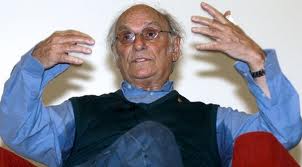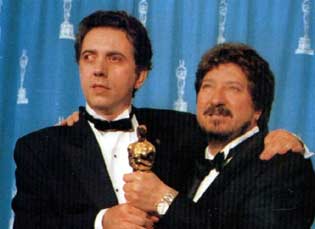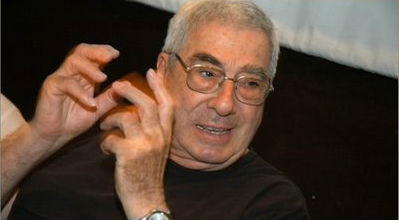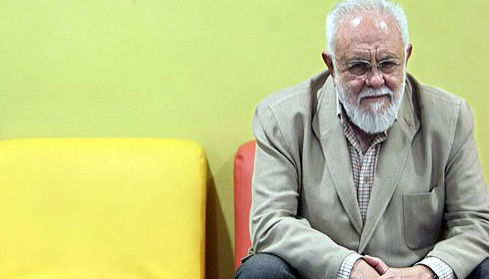The most outstanding things in my
professional life have happened after 1985, and although the over
100 films I have produced are very recent history and I don't want
to go into a detailed account about them, I wish to highlight those
people who have helped make these movies a reality.

CARLOS SAURA.
"El Dorado" is the film that marked
me most both personally and professionally. During the
pre-production, filming and even the premiere, I experienced the
entire gamut of the feelings a producer can feel. If one argues
that being a producer isn't a profession but a way of living, then
my experiences with "El Dorado" are evidence of that. During the
almost two years that I worked on it, I went from being wealthy to
being poor, from feeling strong and protected to feeling weak and
persecuted. Starting from nearly nothing and raising almost one
thousand million (pesetas) was a difficult and risky task. The
intensity of it produced in me a feeling of vertigo of unmatched
proportions. While all this was going on, Carlos Saura, the
excellent director he is, would close his eyes and ears and plow
ahead. Thanks to his attitude and also to Víctor Albarrán, José
Luis García, Francisco Amaro, Juan Manuel Velasco, Rafael Escuredo
and our beloved priests -may God be with them- it was possible to
finish this film and, above all, we were able to get out of Costa
Rica.
Carlos Saura, the only Spanish
filmmaker that can compare to his contemporaries like Kubrick,
Bergman or Bertolucci, apart from "El Dorado", also worked with me
on "La noche oscura" (The Dark Night of the Soul), "¡Ay, Carmela!"
"Marathon", "El sur" (The South) -for the TV series about Borges's
stories-, "Goya en Burdeos" (Goya in Bordeaux) and "Io, Don
Giovanni". Carlos has always insisted in making "his films" without
interference. That insistence in maintaining the authorship of his
own work, much like what Godard did in the 1960s, has been a source
of confrontation between us at one time or another, although such
confrontations have always been friendly, so to speak. Probably
because of that, throughout all these years our collaboration has
been intermittent, although for me it has always been most
enriching. I will always want to work again with Carlos, and I
think he knows that.

FERNANDO TRUEBA, RAFAEL AZCONA.
"Belle Époque" and its Oscar also
occupy an outstanding place in my memory. In this movie, luck and
misfortune, pleasure and pain come together. However, my
participation in the film during its production was insignificant,
and I only attended the shooting one weekend out of courtesy and
almost as a guest. I even felt tempted to tell Fernando not to
include my name in the credits. At the time I was very busy with
the preparation and shooting of "Marathon," during the Barcelona
Olympic Games. However, I honestly think that my involvement in
launching the film internationally was decisive. The two
uninterrupted months I spent with my good friend Enrique Herreros
in Los Angeles, promoting the movie and pushing it with the members
of the Hollywood Academy was a titanic task. For me Belle Époque's
Oscar meant an extraordinary professional acknowledgement, which
enabled me to find a place amongst some of the most distinguished
European producers. On the other hand, just as I wouldn't have
separated from my first wife if I hadn't gone through my experience
with Welles, "Belle époque" too had some very powerful effects on
me that changed my personal life. And changes, however slow they
might be, are changes all the same; they bring with them happiness
but also leave behind traces of grief and bitterness that are
difficult to overcome.

As I have pointed out, my encounter
with Fernando Trueba was very fortunate; together we started
working in "El año de las luces" (The Year of Enlightenment) with
Rafael Azcona, who has written the scripts of the most beautiful
films I have produced. Rafael has participated in over twenty of
the movies that I have been involved with. I doubt that he has
worked harder for any other producer than me; I definitely owe a
lot to him. Not only the scripts he wrote have been significant but
the advice he has given me and even the occasional arguments we've
had have all been useful. Much has been said and written about
Azcona's attributes and skills as a scrpitwriter; in fact he
deserves more credit. Indeed, Rafael is the most important person
that has existed in Spanish Cinema. Without his work for Berlanga,
Ferreri, Saura, Trueba, García Sánchez and Cuerda, perhaps none of
them would enjoy as directors the acknowledgement they enjoy today
and Spanish cinema wouldn't be half as important as it is.
I am very indebted to Fernando
Trueba because, thanks to him, apart from the film "Sé infiel y no
mires con quien" (Cheat with Whoever You Wish), I was also able to
produce "El año de las luces" (The Year of Enlightenment) and
"Belle Époque", "El sueño del mono loco" (The Mad Monkey), "Two
Much", "La niña de tus ojos" (The Girl of Your Dreams), "El embrujo
de Shanghai" (The Shanghai Spell). Apart from Fernando, his wife
and co-producer Cristina Huete - has made them possible too.
Without her, nothing would have been the same and without him, I
wouldn't be the person I am.

GONZALO SUÁREZ.
With Gonzalo Suárez, apart from "La
loba y la paloma" (The Wolf and the Dove) and "Remando al viento"
(Rowing with the Wind), our collaboration continued with "La reina
anónima" (The Anonymous Queen), "El detective y la muerte" The
Detective and Death) and "El portero" (The Goalkeeper). In between
these films, Gonzalo produced other films by himself. Although his
rebellious and individualistic character has led him to escape from
my guidance many times, I have always felt towards him much
admiration and affection. I still consider him to be,
intellectually speaking, the youngest of the directors I work with
and honestly believe that some day, perhaps in the very near
future, we will have the box office success that so far has eluded
us.